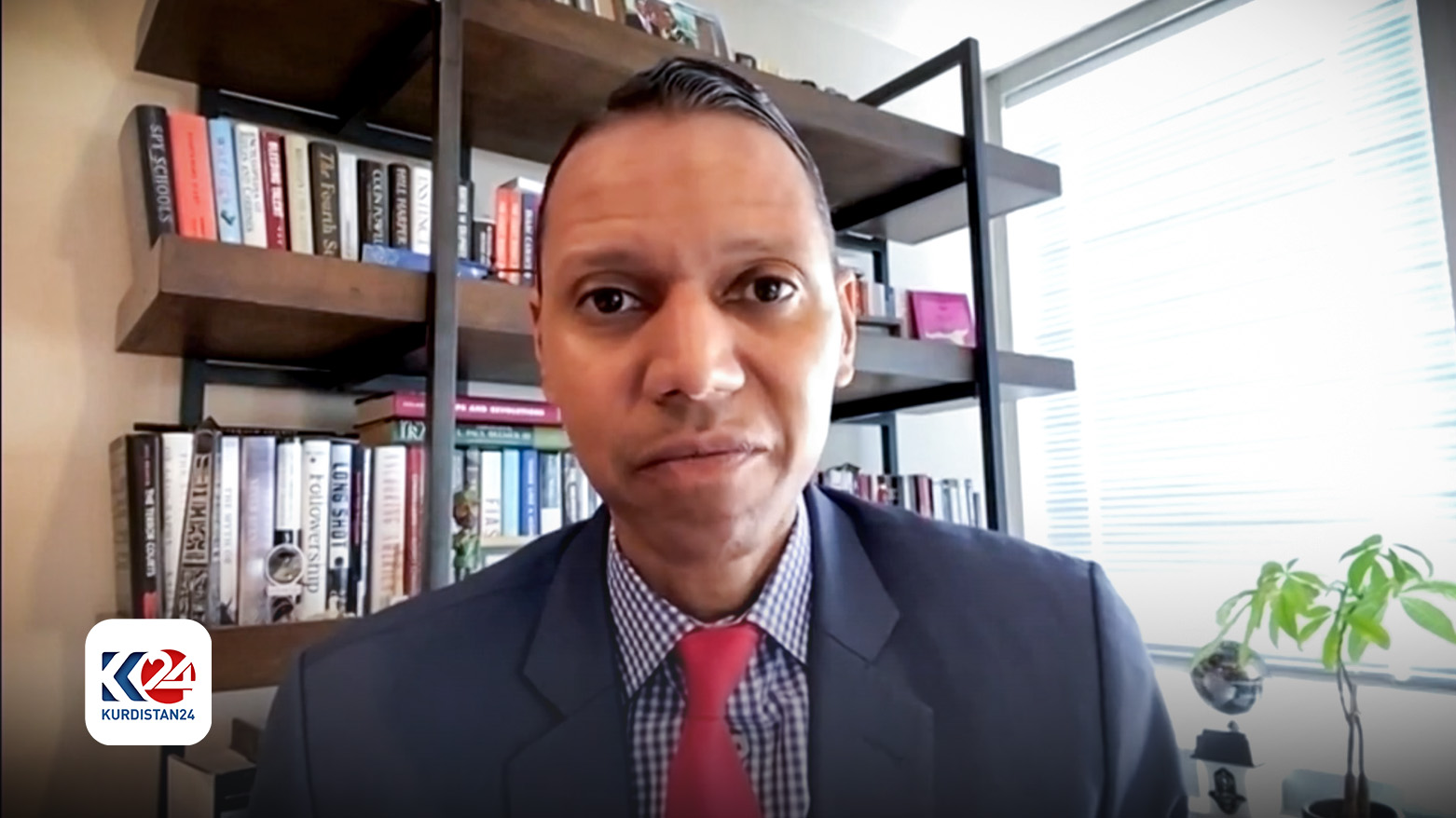Col. Caggins: U.S. Forces Will Stay in Iraq—Talks are About Transition to Bilateral Security Ties
“This big international coalition, with all the flags, that will end, but the presence of and the partnership with international military forces will continue.”

WASHINGTON DC, United States (Kurdistan 24) – Despite multiple media reports claiming that U.S. troops would soon be leaving Iraq, Col. Myles Caggins, a former Spokesperson for the anti-ISIS Coalition and now Spokesperson for APIKUR (Association of the Petroleum Industry of Kurdistan) explained why he believes that claim is quite wrong and why U.S. troops will likely remain in Iraq, including in the Kurdistan Region, for some years to come.
Caggins remarks to Kurdistan 24 closely resemble what Deputy Secretary of State Vedant Patel told journalists on Monday..
Read More: US: Talks with Iraq on ‘Transition’ from Coalition to Bilateral Security Relations are ‘Ongoing’
Caggins remarks are also consistent with what Pentagon Press Secretary Maj. Gen. Patrick Ryder told journalists on Tuesday.
In essence, the basis for the presence of foreign forces in Iraq is changing from a multilateral structure, based on the Coalition against ISIS, to bilateral structures, based on direct understandings between Baghdad and the various foreign countries with troops in Iraq.
This is a crucial issue for the Kurds. As the long-time Kurdish leader, Masoud Barzani, now head of the Kurdistan Democratic Party (KDP), has stressed, including in meetings with U.S. officials, a continued U.S. military presence in Iraq is vital for ensuring its stability and promoting its national interests.
Read More: US Envoy Lauds Meeting with Masoud Barzani
Nonetheless, this situation is being widely misreported, both in Middle Eastern media and in the Western press, as well. They claim that there is an agreement for U.S. forces to leave Iraq over the next two years. However, that is simply wrong.
Col. Caggins: The Future of U.S. Forces in Iraq
Col. Caggins clarified the situation in an interview with Kurdistan 24 on Monday, debunking the notion that U.S. troops would be leaving Iraq any time soon.
As he told Kurdistan 24, “This big international coalition, with all the flags, that will end, but the presence of and the partnership with international military forces will continue.”
Caggins attributed the misunderstanding to “politics,” both in the U.S. and in Iraq. As he noted, the U.S. is holding presidential elections in less than two months.
Since the wars precipitated by the 9/11 attacks began, every U.S. president drew up plans toward the end of his term to withdraw U.S. forces from one Middle Eastern war zone or another. It seems they wanted to show that they had achieved at least one victory.
There is also politics on the Iraqi side. Prime Minister Mohammed Shi’a al-Sudani faces great pressure from Iranian-backed elements in Iraq, including the militias, and Tehran wants U.S. troops out of Iraq.
In addition, Sudani faces re-election next year. So, like Biden, he wants to be able to claim victory.
Thus, as AFP reported, “On Sunday, Iraqi Defense Minister Thabet al-Abbassi told pan-Arab television channel Al-Hadath that the coalition would pull out from bases in Baghdad and other parts of federal Iraq by September 2025 and from the autonomous northern Kurdistan region by September 2026.”
But one has to read carefully! Abbasi spoke of the withdrawal of the coalition—“all the flags,” as Caggins put it–and not foreign forces in and of themselves, whose presence will continue and will be governed by bilateral agreements.
Moreover, “ISIS still remains a threat,” as Caggins affirmed, citing the military operation in Anbar province a week ago that American commandos and Iraqi CounterTerrorism forces conducted together against ISIS.
Read More: Iraq-US joint raid kills 15 ISIS fighters
Read More: Important documents, equipment belonging to ISIS captured during Anbar Operation: Yehia Rasool
Thus, as Caggins explained, “I anticipate that in 2025 and in 2026 and in 2027 there will continue to be American forces in Iraq, at the invitation of the Government of Iraq.”
“They will be providing high level advice and assistance and also providing military support with equipment and some training for our partners in the Iraqi Security Forces and the Peshmerga,” he added.
“The United States and Iraq are transitioning to a bilateral relationship,” he continued. “The other nations in the coalition are also transitioning to a bilateral relationship.”
“This means that each nation will have an independent arrangement with the government in Baghdad and Erbil for an ongoing partnership and presence of forces” for “training, advice, and assistance,” Caggins stated.
Pentagon Position
The Biden administration wants to maintain good ties with the Iraqi government. Related to that, U.S. officials may well be reluctant to publicly contradict what Iraqi officials say.
This issue arose at Tuesday’s Pentagon press briefing. The journalists covering the issue at the Pentagon completely failed to notice the distinction between the coalition presence in Iraq—“all the flags”—which is ending, and the presence of those forces as individual entities, whose future will be governed by bilateral security agreements, as Caggins explained.
Thus, Maj. Gen Patrick Ryder, the Pentagon Press Secretary, who gave the briefing, was asked no less than three times about the supposed withdrawal of U.S. forces from Iraq.
Each time, Ryder gave the same response, neither confirming nor denying those reports.
“Nothing new to announce from here,” Ryder said. “When we have updates, we’ll certainly provide them to you.”
That is entirely consistent with what Caggins told Kurdistan24, but not with the claim that the U.S. and Iraq have agreed on a dramatic new change, like the withdrawal of U.S. troops from Iraq.
It is simply not true.